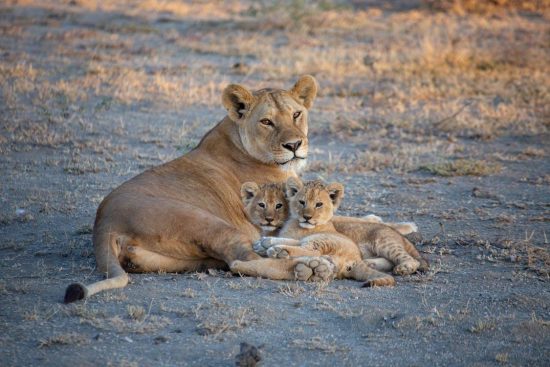The lion is the largest member of the Panthera genus of cats and is indigenous to both Africa and India. It has a small head that is rounded at the top, round ears, and a hairy tuft at the end of its tail. Its body is strong and it has a wide chest. Lions are sexually dimorphic, meaning that mature males are bigger than adult females and have a more noticeable mane than lionesses do.
- Speed: 80 km/h (Maximum, In Short Bursts)
- Lifespan: 15 – 16 years (Female, Adult, in the wild), 8 – 10 years (Male, Adult, in the wild)
- Mass: 190 kg (Male, Adult), 130 kg (Female, Adult)

How many months is a lion pregnant?
The gestation cycle lasts for around 108 days (Humans are around 280days), and the number of cubs that are born can range anywhere from one to six, with two to four being the most common. In most cases, a newborn cub is vulnerable and blind, and it has a thick coat with black patches that, in most cases, go away as the animal matures.
How many times can a lion get pregnant?
Lions that are kept as pets often give birth once a year, while in the wild they typically give birth once every two years at the most. Within the context of a reproductive cycle that is very changeable, the amount of time that females are receptive to being fertilized ranges anywhere from three to four days.
How long do lions stay with their babies/cubs?
When a female lion senses she is going into labor, she will sneak away from the pride and conceal herself in a hidden cave. There, she will give birth to a litter of two to six cubs and stay with them for around three months after they are born.
Do lions really mate 100 times a day?
Lions that are kept as pets often give birth once a year, while in the wild they typically give birth once every two years at the most. Within the context of a reproductive cycle that is very changeable, the amount of time that females are receptive to being fertilized ranges anywhere from three to four days. During this time, a pair would usually mate every 20–30 minutes, and a single day could have as many as 50 successful matings.
How can lions mate so many times?
Male lions are known to engage in intense competition with one another during the mating season, during which they often choose who will hold the position of alpha male in their pride. When male lions mate several times, it increases the likelihood that they will be the dominant individuals in the pride and father the greatest number of pups. In addition to this, it is beneficial for female lions to mate with a number of different males.
Do male lions mate with their daughters?
It is possible that a single man will not be in charge for a sufficient amount of time to mate with his adult daughters. Females will not only mate with the dominant male of their pride, but they may also occasionally mate with males who are not members of their pride.
How long does a baby lion stay with its mother?
The weaning process for the cubs typically takes between six and ten months to complete. Even when they are no longer breastfeeding, this does not always indicate that they have left the cot. They still get the majority of their food from their mother and the rest of the pride, which they do by sharing the prey that has been slain by other members.
Do lions have a shorter lifespan due to frequent pregnancies?
There are no known lion lifespan differences between males and females based on the frequency of pregnancies. Both male and female lions have a similar average lifespan in the wild, which ranges between 10 to 14 years. Other factors like territory disputes, hunting, diseases, and age play a more significant role in determining their lifespan.
Can a Pregnant Lion Jump or Climb Fences?
The lion’s jumping abilities and fence clearance during pregnancy can be significantly affected. As pregnancy progresses, a lion’s physical agility declines, making jumping or climbing fences a challenging task. The size and weight of the growing belly pose limitations, potentially hindering their movements. Therefore, pregnant lions may find it difficult to navigate obstacles like fences.
Do Tigers and Lions Have Similar Reproduction Patterns?
Tigers in cold habitats and hibernation have different reproduction patterns compared to lions. While tigers can breed throughout the year, they tend to mate more frequently during the winter months. In contrast, lions do not hibernate and do not have a specific breeding season. Understanding these variations is crucial for conservation efforts and ensuring the survival of these magnificent big cats.
Why do female lions roll over after mating?
A lioness that is about to go into heat, like her other feline relatives, will signal that she is ready to mate by leaving scent markings, making mating calls, rubbing against things, and rolling about on the ground.









